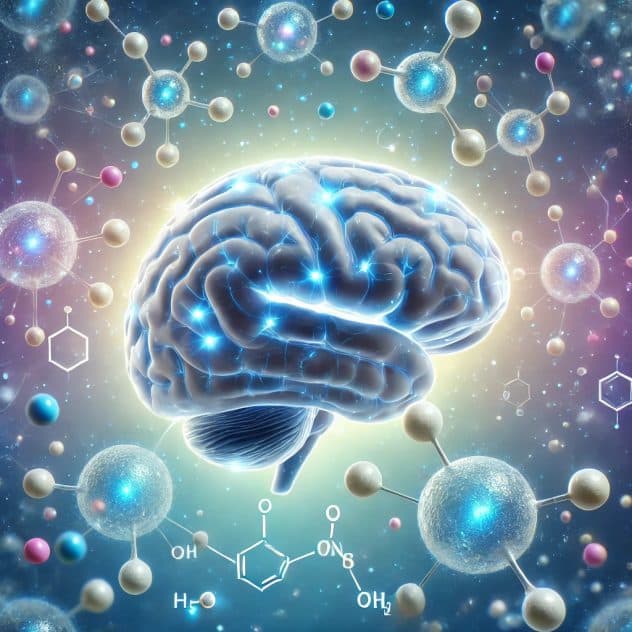
Let’s talk about something that’s often overlooked but absolutely crucial: hormones and how they might just be the hidden puppet masters behind some of the challenges faced by neurodivergent individuals. We’re talking ADHD, autism, dyslexia, and all the other wonderfully complex ways the brain can be wired differently. We tend to focus a lot on genetics, neurology, and all that technical jazz, but have you ever considered how hormones could be playing a bigger role in all this? Those chemical messengers that come from places like the thyroid, adrenal glands, and ovaries? Yeah, them. They impact everything, mood, metabolism, and cognitive function, including how we think, feel, and regulate ourselves. It’s time to give hormones the attention they deserve. So buckle up, because we’re about to dive headfirst into the rollercoaster of hormonal and neurodivergence, don’t worry, it’s got seat belts, but we can’t guarantee no emotional whiplash.
The Hormonal Influence on the Brain
The brain’s a bit like that one friend who’s always the first to panic when things change. It’s super sensitive to hormonal fluctuations, which makes sense given how much hormones control. From the very first moments of life to adulthood, hormonal changes influence our cognitive functions, emotional regulation, and even how we socially interact. And for neurodivergent individuals, whose brains may already take the scenic route to processing info, these fluctuations can make things even more intense.
Take ADHD, for instance. Many with ADHD report that their attention, impulsivity, and mood can be all over the place depending on their hormonal state. Puberty is a particularly tricky time, testosterone and oestrogen are in full swing and suddenly, everything is a little more, let’s say, dramatic. Women, in particular, often find that their ADHD symptoms are more intense during certain parts of the menstrual cycle. In the premenstrual phase, when oestrogen and progesterone take a nosedive, cognitive performance and emotional regulation often take a hit too. In short? Hormones and ADHD are like that strange friendship between milk and coffee, you don’t really get them until you try to balance them.
Unlock peak brain performance with science-backed biohacks. Join free now & get your guide for just £4.99 (45% off)!

But What About Hormones and Neurodivergence in Men?
Hormones aren’t just messing with women’s brains, men with ADHD can experience their own hormonal rollercoasters, especially during times of stress or after exercise. Yes, physical activity can affect hormones too, but hey, exercise also helps stabilise them. The key takeaway here is that hormones affect both men and women in different ways, and if you’re not factoring them into your ADHD management plan, you might be missing out.
Want a pro tip? If you’re noticing that your symptoms get worse at specific times (say, around your period, or post-exercise), tracking your hormonal cycle might give you some insights. Pairing that with lifestyle changes like diet (hello, brain food) and sleep management could make all the difference. Speaking of sleep… let’s circle back to that in a bit.
You can read more about the impact of hormonal fluctuations on ADHD here.
Hormones and Autism Spectrum Disorder (ASD)
Now, let’s talk autism. You might be wondering what hormones and neurodivergence have to do with autism traits. Turns out, plenty. Growing evidence suggests that prenatal exposure to higher levels of testosterone may be linked to the development of autism traits. Yep, even before birth, hormonal influences can shape how a person’s brain develops, particularly when it comes to social interactions and sensory processing. But that’s just the beginning. When puberty hits, hormones wreak havoc in everyone’s life, but for those with autism, these changes can be a bit more… intense.
Puberty is hard enough, but for neurodivergent individuals, the hormonal storm can really turn things up a notch. You might see increased anxiety, social difficulties, or even repetitive behaviours becoming more pronounced. It’s like trying to solve a Rubik’s Cube while riding a rollercoaster. And don’t even get me started on how the body changes during this time, it’s like your brain and body are both entering new territory and no one’s got a map.
Understanding these hormonal shifts in autism can lead to better ways to support and manage the experience. Mindfulness (hello, meditation for ADHD) can help smooth out some of those emotional bumps, and therapies like CBT (which we covered previously) can offer more structure to dealing with those fluctuations. For those looking for alternative routes, neurofeedback has also proven to help people with autism navigate the stormy seas of hormone-induced chaos.
Gender and Hormones in Neurodivergence
Now for the real fun: gender. Hormones and neurodivergence don’t just hang out in the usual “male vs. female” boxes. Neurodivergent folks, especially those with autism or ADHD, often experience their traits through the lens of gender, which brings its own set of challenges. Autism, for example, has long been seen as more prevalent in males, but hold up, it presents differently in females. Surprise! Women often get misdiagnosed or underdiagnosed because their autism might show up in ways that aren’t as obvious. And guess what? Hormonal changes, from menstruation to pregnancy and menopause, can affect how autism or ADHD manifests, which can make it even harder to spot and diagnose. And then, there’s vibration therapy or acupuncture, which may help modulate these symptoms and make things a little more manageable.
And here’s where it gets even more fascinating—gender affirming care. If you’re trans or non-binary, the hormonal treatments you undergo, such as HRT, can affect not only your physical self but also your neurodivergent traits. HRT can alter cognitive function, emotional regulation, and sensory experiences. So, how does it interact with ADHD or autism traits? That’s still under exploration, but one thing’s for sure, customising care for trans and non-binary individuals will require understanding these complex interactions. It’s not just a matter of a “one-size-fits-all” approach. Whether it’s through CBT, acupuncture, or even mindfulness, the support needs to be tailored specifically.
The Role of Hormones in Mental Health
Let’s talk about mental health, because guess what? It’s all connected. If you’re neurodivergent, there’s a good chance you’re no stranger to anxiety, depression, or even bipolar disorder. Hormones and neurodivergence are closely linked Take cortisol, the “stress hormone.” If you’ve got ADHD or autism, you’re already more sensitive to stress, and then hormonal changes during things like menopause or the menstrual cycle can just send everything into overdrive.
And here’s where things get interesting: if you’re a woman with ADHD, for instance, menopause might throw an even bigger wrench into your cognitive function. When oestrogen levels start to dip, focus, memory, and emotional regulation can get worse. It’s like suddenly the ADHD you’ve been managing all these years is now on turbo mode. But once again, understanding this connection opens up a whole new world of treatment possibilities, like CBT or neurofeedback, which we’ve explored before. Together, these treatments could help balance the neurodivergence and hormonal shifts, leading to a smoother ride.
Here’s another pro tip: don’t forget about diet. Hormonal balance, mental health, and neurodivergence all intertwine with what we fuel our bodies with. Gut health plays a role here, too, and we’ve already seen the massive impact it has on ADHD. So, don’t neglect that gut-brain connection when tackling hormone-induced mental health shifts!
Moving Forward: Integrating Hormonal Considerations
We need to stop treating hormones like the “secret sauce” we don’t talk about in the ADHD or autism treatment world. The connection between hormones and neurodivergence is clear, but still often overlooked. Medical professionals are finally starting to consider hormonal factors when diagnosing or treating neurodivergent individuals, but it’s not happening fast enough.
For those of us with ADHD, autism, or other neurodivergent traits, integrating hormone-related assessments into the diagnostic process could make a massive difference. Imagine knowing that your ADHD symptoms worsen in the days leading up to your period (for example), and being able to adjust your treatment plan accordingly. Or for those undergoing gender-affirming care, understanding how HRT interacts with neurodivergent traits is crucial for tailoring the best possible support.
Conclusion
Hormones and neurodivergence are more connected than we give them credit for. Hormonal shifts influence everything from emotional regulation to cognitive abilities, and can significantly impact conditions like ADHD and autism. By better understanding these connections, we can create more personalised and effective treatment plans, particularly for those whose experiences are shaped by the intersection of gender, neurodivergence, and hormonal fluctuations. With more research, we can hope for a world where neurodivergent individuals get the holistic support they need, hormone balance and all.
Now, who knew that hormones had such an impact, right? It’s time to take this hidden connection seriously. Let’s and get on with the important work of supporting everyone’s neurodivergent brain, hormones and all.
Please note: While we share information and tips to support your journey, we are not health professionals. Always consult a qualified healthcare provider before making any changes to your wellness routine. Your health is personal, and we’re here to help guide you, not diagnose or treat.






